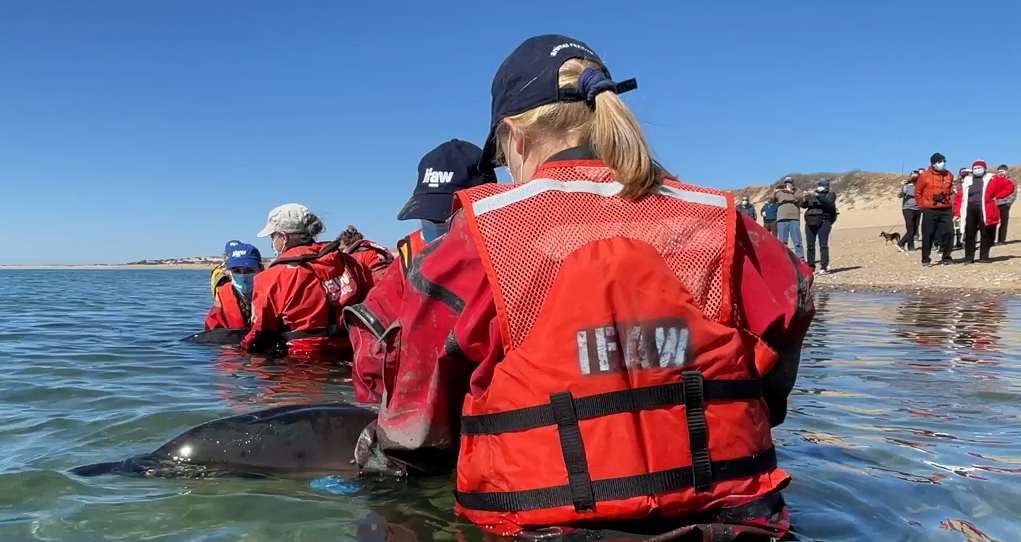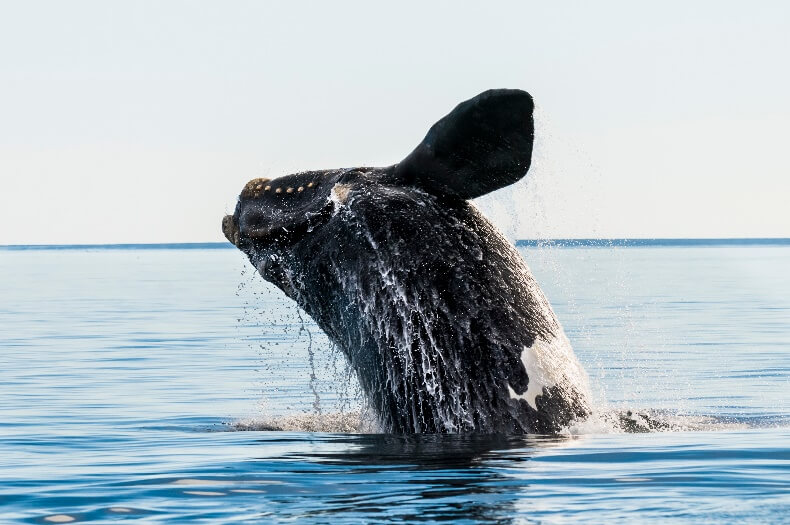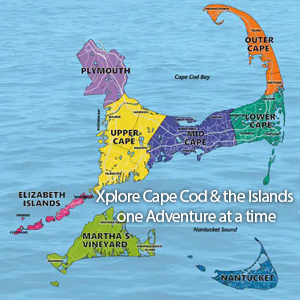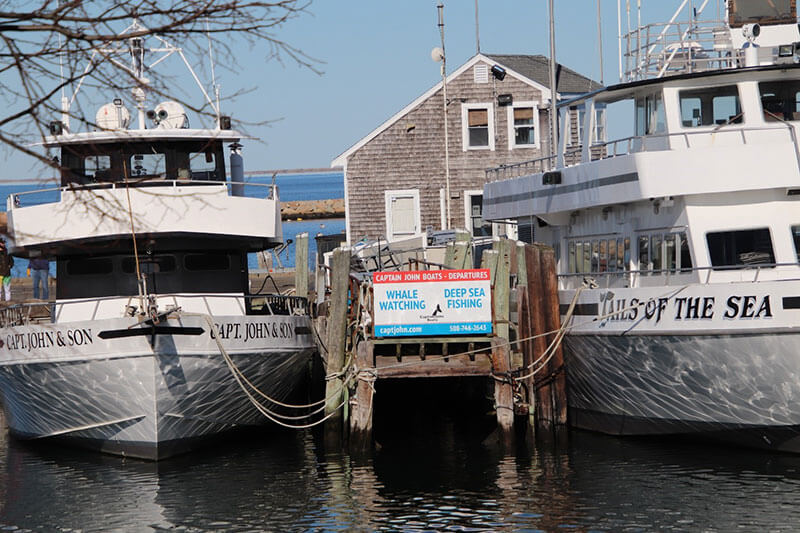
Whale watching on Cape Cod is an exciting and popular activity that attracts thousands of visitors every year. The season for whale watching typically kicks off in early spring (April), as the first whales begin to migrate to the waters around Cape Cod.
Cape Cod is home to a diverse range of whale species, including the majestic North Atlantic right whale, humpback whales, fin whales, minke whales, and blue whales. The first to arrive each spring is normally the North Atlantic right whale. This year to raise awareness for the endangered marine mammals, the state has declared April 24th the first-ever Massachusetts Right Whale Day.
As the weather warms up and the days get longer, more and more whales arrive in Cape Cod, providing an incredible opportunity for visitors to observe these magnificent creatures up close and personal in their natural habitat.
Why not take a whale watching tour? With knowledgeable naturalists and experienced boat captains leading the tours, visitors can learn about the whales’ behaviors, migration patterns, and conservation efforts while enjoying a thrilling and unforgettable whale-watching experience.
April Welcomes the North Atlantic Right Whale to Cape Cod
The Atlantic right whale, one of the rarest and most endangered species of whale, is beginning its annual migration to Cape Cod this April. Every year, these magnificent creatures make the long journey from their calving grounds off the coasts of Florida and Georgia to the rich feeding grounds in the waters off Cape Cod.
The migration usually begins in late November or early December and continues through April, with the whales traveling over 1,000 miles to reach their destination. Once the whales arrive, visitors to Cape Cod have the unprecedented opportunity to witness these gentle giants up close and personal, as they feed and frolic in the waters off the coast.
The Atlantic right whale is a majestic creature, growing up to 55 feet long and weighing as much as 70 tons. They are easily recognizable by their broad, black bodies and their distinctive white callosities, which are rough patches of skin that form around their mouths and eyes. These callosities are unique to each individual whale, making it possible for researchers to identify and track them. No two are alike.
Unfortunately, the Atlantic right whale is also one of the most endangered species of whale, with only an estimated 350 individuals left in the wild. The biggest threats to their survival are entanglement in fishing gear and collisions with ships, which can cause serious injury or death.
Closure of the Cape Cod Canal
The Cape Cod Canal closes (it’s closed twice so far this year 2023) for the Atlantic right whales to protect them during their migration. The U.S. Army Corps of Engineers operates the canal and typically implements the closures from November 1st to April 30th each year to coincide with the whales’ migration season. During this time, vessel traffic through the canal is restricted to help prevent collisions between the whales and boats.
The closure of the Cape Cod Canal is just one of many measures that are taken to protect the endangered Atlantic right whales. The U.S. government also implements speed restrictions for vessels in areas where the whales are known to congregate, and many fishing gear manufacturers have developed gear that is designed to minimize the risk of entanglement.
Whale Safety and Conservation Measures on Cape Cod
Safety and conservation measures are crucial for the survival of the Atlantic right whale, as entanglement in fishing gear and collisions with boats are two of the biggest threats to their population.
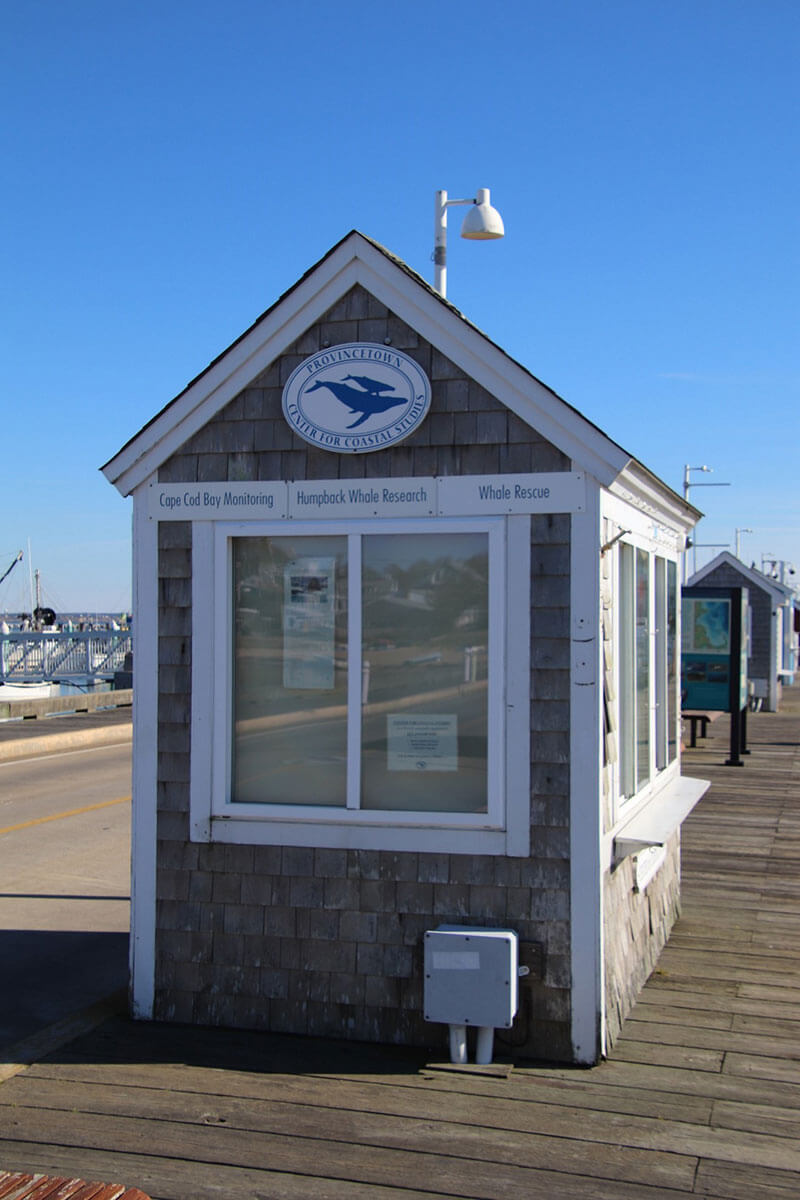
Despite these efforts, the population of Atlantic right whales continues to decline, making it more important than ever to support conservation efforts and raise awareness about their plight. By visiting Cape Cod during the whale watching season and supporting responsible whale watching companies, visitors can help ensure that these majestic creatures continue to thrive for generations to come.
The annual migration of Atlantic right whales to Cape Cod is a truly awe-inspiring event. As visitors flock to the Cape to witness these magnificent creatures in their natural habitat, it is important to remember the threats they face and the importance of supporting efforts to protect them. With continued conservation efforts and responsible whale watching practices, we can help ensure the survival of this magnificent species for years to come.
Other Types of Whales That Visit Cape Code
In addition to the Atlantic right whales, there are several other types of whales that can be seen around Cape Cod during their migration seasons.
Here are a few examples:
- Humpback Whales: Humpback whales are one of the most commonly sighted whales in Cape Cod. They can be seen from April to November, with peak sightings occurring from June to August. Humpback whales migrate from their breeding grounds in the Caribbean and the Gulf of Mexico to their feeding grounds in the North Atlantic.
- Fin Whales: Fin whales, also known as “razorbacks,” are the second-largest species of whale after the blue whale. They can be seen in Cape Cod from April to November, with peak sightings occurring in June and July. Fin whales migrate from their breeding grounds in the southern hemisphere to their feeding grounds in the North Atlantic.
- Minke Whales: Minke whales are the smallest baleen whales and can be seen in Cape Cod from April to October, with peak sightings occurring in July and August. They migrate from their breeding grounds in the Caribbean to their feeding grounds in the North Atlantic.
- Blue Whales: Blue whales are the largest animals on Earth and can be seen in Cape Cod from June to September. They migrate from their breeding grounds in the southern hemisphere to their feeding grounds in the North Atlantic.
These are just a few examples of the types of whales that can be seen around Cape Cod during their migration seasons. It is important to note that the exact timing of their migration may vary from year to year, and weather and ocean conditions can also affect their sightings. However, whale watching tours and whale watching captains can provide visitors with the best information on when and where to see these magnificent creatures.
Book a Whale Watching Tour
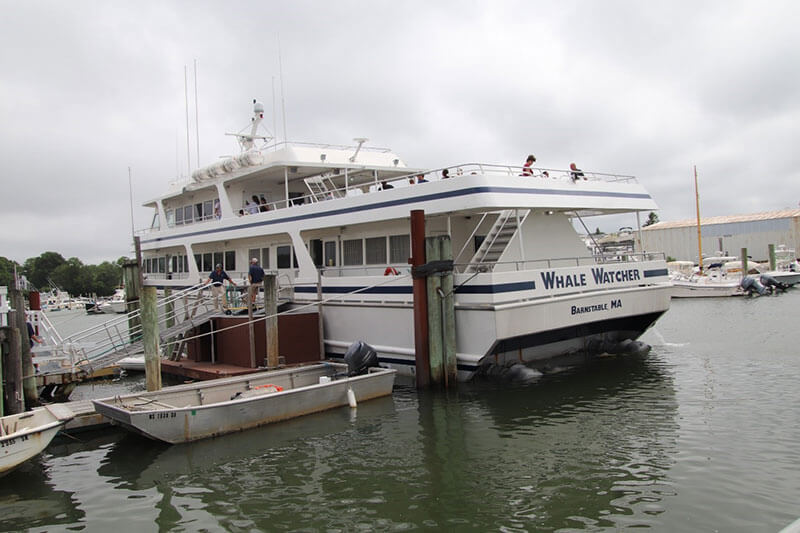
If you want to see the whales up close, then why not book a whale watching tour? The average price is approximately $75 per person. You can also opt to take a private or semi-private charter which averages $180 per hour. Each charter company has their own limits of people and hours chartered.
Examples of whale watching tours in Cape Code:
- Dolphin Fleet Whale Watch: This company offers whale watching tours departing from Provincetown, Cape Cod. They have been operating for over 40 years
- Hyannis Whale Watcher Cruises: This tour company offers whale watching tours departing from Barnstable Harbor, Cape Cod. They have a team of marine biologists and naturalists onboard to provide educational commentary during the tour.
- SeaSalt Charters: This company offers private whale watching tours departing from Provincetown, Cape Cod. They specialize in small group tours, allowing for a more personalized experience.
- Captain John Boats: This company offers whale-watching tours departing from Plymouth, Massachusetts, which is a short drive from Cape Cod.
These are just a few examples of the many whale watching tours available on Cape Cod. It’s important to research different companies and read reviews to find a reputable and responsible tour operator that prioritizes the safety and well-being of the whales. Visitors should also be prepared for varying weather conditions and ocean conditions, as well as the possibility of motion sickness while on the boat. Many whale watching tours do not start until May. Early in the season, tour operators often offer only limited tours in April from Plymouth and Barnstable.
It’s not uncommon to not only see whales but also enjoy sightings of porpoises/ dolphins, sharks, seals, seabirds, and the occasional sea turtle.
Conclusion
Whale watching in Cape Cod is an incredible experience that offers visitors the chance to witness some of the largest and most magnificent creatures on Earth. With a variety of whale species, including Atlantic right whale, humpback, fin, and minke whales, visitors are almost always guaranteed a breathtaking sighting.
Whale watching tours in Cape Cod are not only an exciting adventure, but also an opportunity to learn about marine conservation and the importance of protecting these incredible animals and their habitats. Whether you’re a nature lover, an adventure seeker, or simply looking for a unique experience, whale watching in Cape Cod is a must-see attraction that will leave you with memories that will last a lifetime. Book early so you are guaranteed a spot on the boat for a tour of a lifetime!



